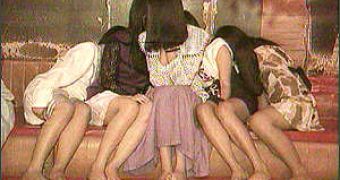In the human species, there is a natural birth sex ratio (the number of newborn boys compared to the number of newborn girls) is about 103-106 : 100. At the age of 20, this ratio can be 100:100, as male babies are more vulnerable to diseases and have a higher mortality rate.
But when an ignorant cultural preference for boys (according to the Chinese tradition only a son can do the funerary rites for his parents and ancestors) collides with modern reproductive technology and one child policy, the result has been this, since the 1970s: 18 million extra Chinese men. By 2020 they will be over 37 million. 20 % more than women. This means 5 men for 4 women. One man in five will not encounter a wife.
In the past, undesired girls were abandoned; but modern technique allows their abortion and an increased number of Chinese couples have access to ultrasound pregnancy check for killing the female embryos (even if illegally), a practice called gendercide.
Each year, 2 million more boys are born and there are 70 million more Chinese boys than girls. In the southern Chinese provinces of Canton and Hainan there is a birth sex ratio of 130 - 135 boys for every 100 girls (!) (these are world records).
40 million young single men, concentrated in economically poor rural areas (thus sexually and economically frustrated young men) can be a source of social turmoil. Married guys are not so eager to go to war or start revolts.
"Some are worried that military adventurism and internal violence could be outcomes for societies with disproportionate numbers of unmarried young men. Some pervert implications of gendercide could be that the increasing global scarcity of women will turn them more "valuable" as a group, like elevating the social status of the victims. But in practice, in societies that practice gendercide, young women are treated even less humanely as they become scarcer: their current lack has in fact triggered an increased women trafficking as sex slaves, and it did not increase their social prestige." said the U.S. Census Bureau's Judith Banister.
The scarcity of women in China triggered a unique social phenomenon in northeastern China: buying wives. People in North Korea are dying of hunger, and the border between China and North Korea turned into 'a wife market'. Between 1997 and 2001, a number of about 30,000 Korean women were sold in China. A trade boosted by the misery of the communist state, in which about 3 million people died of hunger in the '90s.
Since 1997, about 300,000 Korean refugees have come to China and about one third could live there. Life in North Korea means obsession for the next meal, entire families in search of food, dead people on the streets or inside the houses, common graves, abandoned cities, children that do not develop, and even cannibalism. Hunger touches all social classes, except those faithful to the Communist Party and those in the Army.
Over half of the refugees are women. To escape their miserable situation, many marry a Chinese man and try to start a new life. Some are lucky by having a family on the other side of the border, but those who are alone turn into prey for organized armed Chinese mafia bands or simple amateurs. The buyers are: bars, karaoke clubs, but especially Chinese men facing trouble in encountering women in the increasing competition: farmers, elders, mutilated or diseased ones.
In fact, one out of three Korean women crossing the border is likely to be sold.
The women "hunters" even go to North Korea in search for despaired victims, especially in train stations, work camps, roads and isolated villages. In China a Korean woman costs $ 340-1700 (240-1,200 Euro), a high price if we take into account that the average income in China is of $ 120 (85 Euro). The sum to be paid to the Korean customs officers is $ 85 (60 Euro). Beauty, age, virginity, physical estate and health are criteria for establishing the price. Some of the sold women are kidnapped from North Korea.
Besides gendercide, the rural China also faces the massive exodus of the women to the cities, who prefer working there than in the fields. For a Chinese farmer, a Korean woman means the work over a year, but she is the ideal woman: working and submissive. Few people will say they bought a woman. Sometimes, even the women do not know they were the object of a commercial transaction.
In some cases, a woman can be sold several times, up to six. If the husband wants to get rid of the wife, under the menace of denunciating her to the Police, he resells her. The caught Koreans, delivered back to North Korea, face a somber future: working camps, the "ideological wash" and classification of her entire family as contra-revolutionary. Occasionally, even execution.
Many of these women try to start a new life, but they carry the burden of being bought. And the Chinese husband can remind her of this continuously. Some have left behind families and hear news about their children dead because of hunger in North Korea.
Most of them are exploited in China, because people take advantage of their clandestine status and pay them less than they should. The sons of the sold mothers are not civilly recognized, that's why many clandestine aborts are made.
To remain in China, a Chinese name and birthplace are necessary. This causes acts traffic. Acts coming from dead people are sold to the refugees for considerable sums: $ 1,700-5,100 (1,200 to 3,600 Euro).

 14 DAY TRIAL //
14 DAY TRIAL //